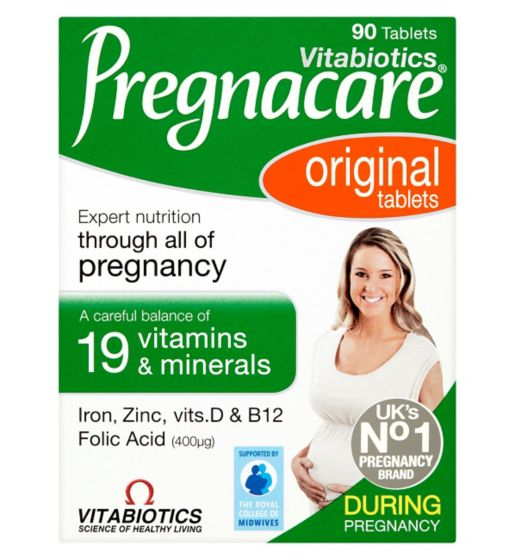Prenatal vitamins are supplements that contain daily vitamins and minerals you need before and during your pregnancy. Folic acid is the most important vitamin to take when planning a pregnancy. Folic acid is a B vitamin that cells in your body need for growing and developing.
Taking 400 mcg of folic acid every day for at least 1 month before and during pregnancy can help lower the risk for problems with the baby’s brain and spine — called neural tube defects (NTDs). Some women, like those who have had a pregnancy affected by NTDs or with sickle cell disease, may need more folic acid. Talk to your doctor or nurse about the dose that is right for you. Most nutrients should come from the foods you eat, but it’s also a good idea to take prenatal vitamins. Your nurse, doctor, or midwife can recommend the best vitamins for you.
When do I need to start taking prenatal vitamins?
Start taking folic acid at least 1 month before you start trying to get pregnant. The first few weeks of pregnancy are a really important time for fetal health and development. Taking folic acid and other prenatal vitamins can help reduce the risk of some birth defects. Keep taking prenatal vitamins throughout your entire pregnancy.
What is Pregnacare?
Pregnacare is a prenatal vitamin supplement that has been trusted for over 30 years. It is a scientifically developed formulation by Vitabiotics, that puts years of research on pregnancy and nutrition in a single tablet. Pregnacare comes in several variants. Pregnacare Plus for example is recommended as soon as you start trying to conceive to help safeguard your nutritional needs before you find you are pregnant and throughout the whole of your pregnancy. Pregnacare Plus can be used for as long as required, and can be started at any point during pregnancy.
Can I Take Pregnacare And Folic Acid Together?
Pregnacare prenatal vitamins provide comprehensive nutritional support which contains 400µg Folic Acid, the level of Folic Acid recommended for all women from the start of trying to conceive until the 12th week of pregnancy. Please note, doctors may sometimes prescribe a higher level of folic acid (5mg) for some women who are at higher risk (for example, a family history of neural tube defects, women with diabetes or taking anti-epilepsy medicine). If this is the case, Pregnacare may still be taken alongside, of course in consultation with your doctor. However, generally speaking an additional folic acid supplement is not needed along side Pregnacare, as it contains the recommended level for most women.
Do prenatal vitamins have side effects?
A lot of people wonder about prenatal vitamins side effects. Some people get nauseated or constipated from taking prenatal vitamins. If this happens to you, talk with your doctor about changing brands or the types of vitamins you’re taking.
Prenatal vitamins come in tablets or capsules, so finding the kind that works best with your body can help ease side effects. Your doctor or midwife can help you find a prenatal vitamin that will work best for your body.
Prenatal vitamins and diet during pregnancy
Despite taking prenatal vitamins, at some point in your pregnancy, you might want to eat absolutely nothing. At another point, you might want to eat everything in sight.
While pregnant, you are at a higher risk for food-borne illnesses. Wash hands and surfaces often, cook foods thoroughly, keep raw and prepared foods separate, and never eat refrigerated foods that have been allowed to get warm or cooked foods that have cooled outside of a refrigerator.
Foods to avoid during pregnancy;
- Raw or undercooked eggs (homemade Caesar dressing, soft-boiled eggs, meringue pies, hollandaise sauces)
- Raw dairy products (unpasteurized milk or cheeses; soft cheeses including brie, camembert, feta, blue, queso fresco blanco and gorgonzola)
- Refrigerated or deli patés, meat spreads, smoked seafood (lox, salmon or trout; often labeled nova style, kippered or jerky)
- Raw or rare meat
- Raw or undercooked shellfish
- Raw fish (sushi)
- Deli meats, lunch meats, hot dogs (UNLESS they are heated until they are steaming)
- Raw sprouts (alfalfa)
- Fish with high levels of mercury including shark, swordfish, tilefish, and king mackerel
Limit fish consumption to 12 ounces per week. Avoid tuna steaks, but up to 6 ounces of canned tuna can be eaten each week. Limit locally caught fish to 6 ounces per week. READ Best Fertility Drugs and Supplements.





